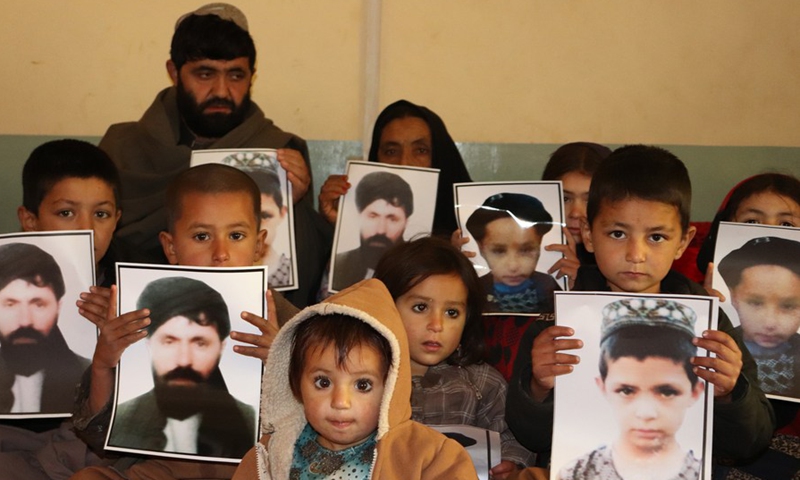Aussies in China ashamed, disappointed at Morrison’s accusation against diplomat
By Li Sikun and Hu Yuwei Source: Global Times Published: 2020/12/3 21:08:40

Photo taken on Nov. 22, 2020 shows the relatives holding pictures of Afghan victims killed by Australian troops during military operations in Tirinkot, capital of Afghanistan's Uruzgan province. (Xinhua/Sharafat)
Amid an escalating war of words around a cartoon depicting atrocities committed by Australian soldiers against Afghan civilians, an Australian who has lived in China for 10 years has something to say: "Today, as an Australian, I feel ashamed. The Australia I left 10 years ago compared to the Australia of today is entirely different."
Hazza, a Queenslander whose real name is Harry Harding, got involved in the spat between China and Australia after Australian Prime Minister Scott Morrison demanded China apologize for an illustration showing an Australian solider killing an Afghan child, based on real photos and leaked information documenting such war crimes.
He said that, as an Australian living in China, he has observed this attitude grow and felt sorry to see Australia has felt fearful or resentful of China instead of enjoying a stable and mutually beneficial relationship.
Hazza grew famous in the Chinese media in 2011 for recording Chinese songs. He went on to become a TV and radio host in South China's Guangdong Province.
"I was shocked to hear the findings of the report [an investigation report by the Australian Department of Defense, which the cartoon was based on]. There are no words to describe how distressing it was to hear that," said Hazza, noting that there's much to be done to make sure that this never happens again.
Commenting on the spiraling degradation of bilateral ties between Beijing and Canberra, Hazza said that the major reason is "lack of understanding," and that the Australians are not prepared for China's rise.
"We need more Australians to learn Chinese, understand how the country works, and engage meaningfully with China."
Hazza is not the only Australian involved with China who expressed such feelings.
Jason, an Australian who spent six years living and studying in several cities of China, said he felt upset to see the ties between the two nations "severely broken down" and trust disrupted "not only in government but also among the public."
"An anti-Chinese sentiment has emerged in Australian society that is not conducive to fostering grassroots ties. This is unfortunate, making it difficult for an immediate breakthrough. I expect it will be a long time before relations improve," Jason told the Global Times.
Jason noted that Chinese-Australians friendships have been adversely affected by the tensions, and there has been an increase in baseless racial insults and violence from a minority of people against China, though he has not experienced vilification or discrimination against from Chinese people in China.
Jason regards the cultural and ideologies differences as a key barrier for misunderstanding between the two governments and peoples. "Both Australia and China should be very aware of the cultural gap in their negotiation as distinctive mindset would bring serious misunderstanding," he warned.
"But I don't think ideology should determine a country's foreign policy," Jason argued.
"I really hope China-Australia relations return to normality. However, we have to be realistic in the short-term. Such a breakdown is going to require a long time to repair, potentially even needing a change of government in Australia or drastic policy shift. A tense China-Australia relationship is unhealthy for the region and the people of both nations," Jason suggested.